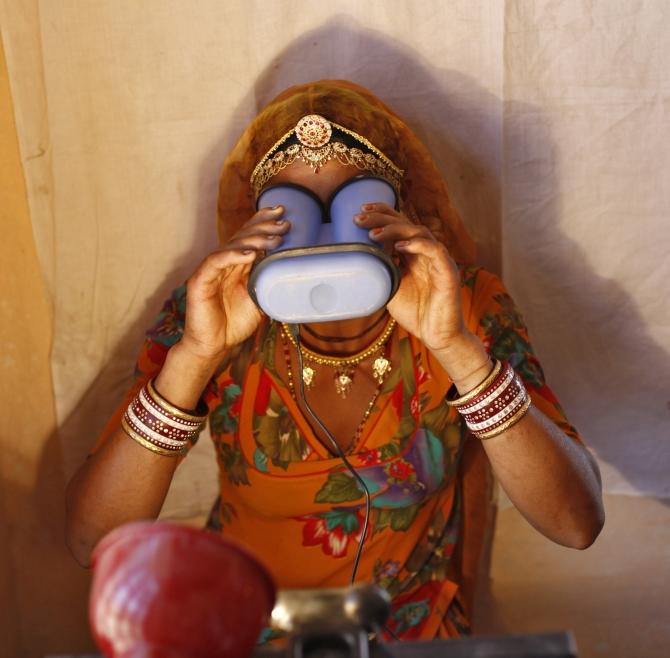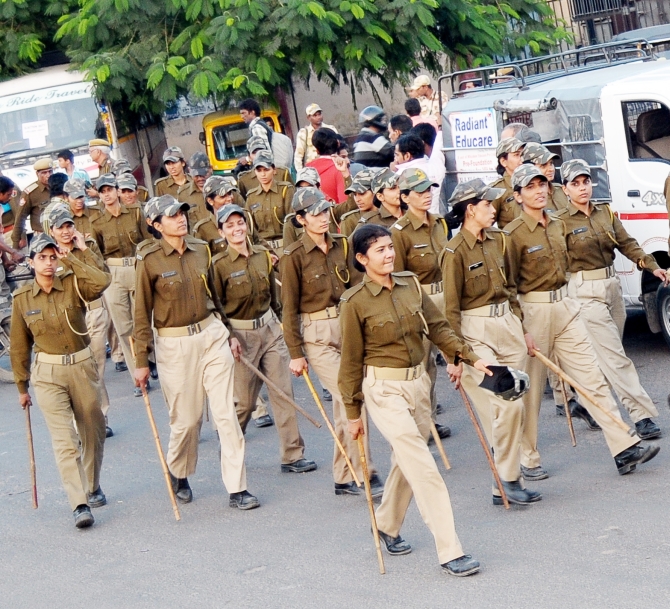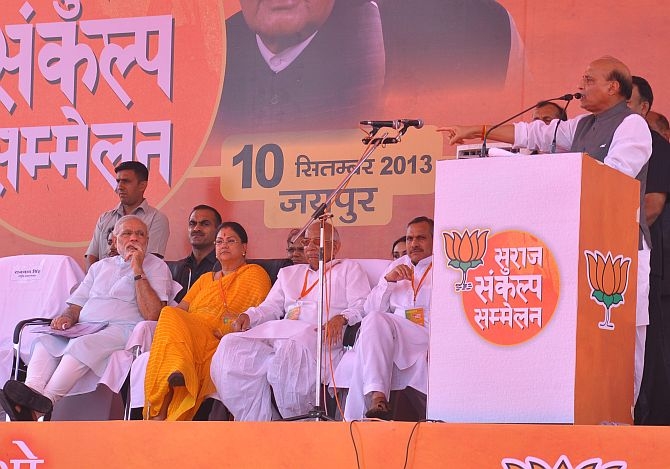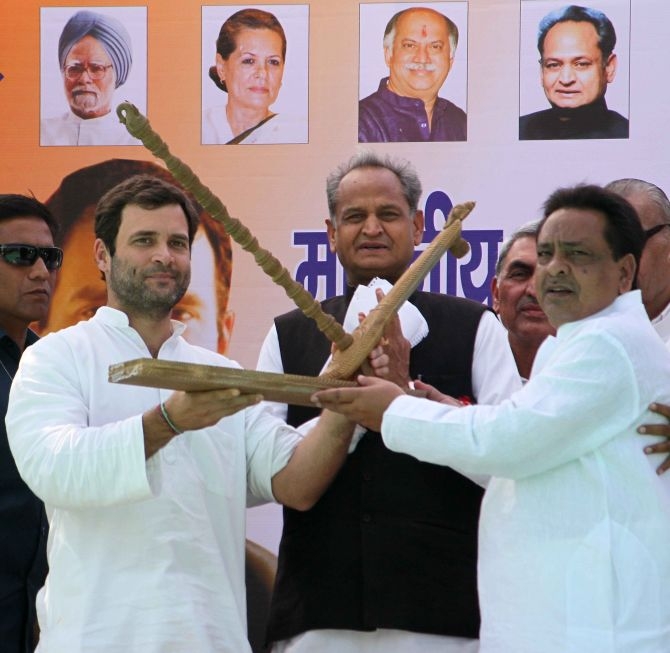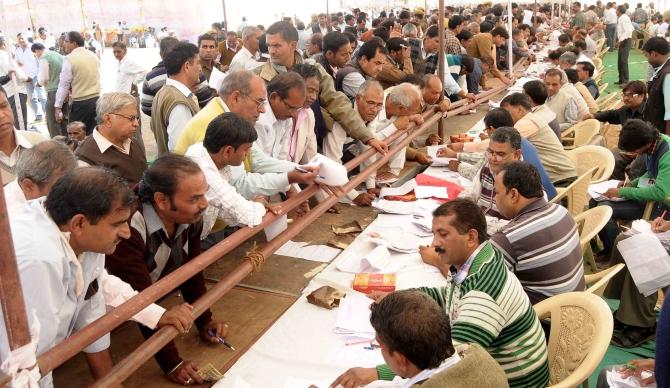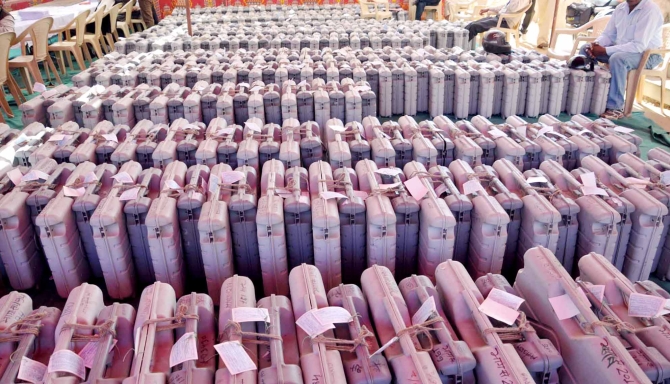 | « Back to article | Print this article |
What will Rajasthan choose?
Massive campaigning by BJP's prime ministerial candidate Narendra Modi may have given the saffron party a slight edge over the ruling Congress, believes PB Chandra
On Sunday, Rajasthan will witness the fiercest electoral battle in the history of the state.
Of the 200 assembly seats up for grabs, 199 will go to polls on Sunday. Polling in Churu constituency has been deferred till December 8 because of the death of a candidate.
While the main clash is between the ruling Congress and the Bharatiya Janata Party, smaller parties and independent candidates have joined the fray and complicated matters for poll pundits.
Massive campaigning by BJP's prime ministerial candidate Narendra Modi may have given the saffron party a slight edge over the ruling Congress.
BJP and Congress candidates are going up against each other in 118 constituencies, while the fight is triangular or four-cornered in the remaining seats.
The newly floated Rashtriya Janta Party, formed by Scheduled Tribe leader Kirori Lal Meena, is likely to bag six to eight seats while the Bahujan Samaj Party may win five to six seats.
The RJP may spoil the poll prospects of both the Congress and the BJP in some constituencies, including in 24 reserved seats for STs and in six general seats.
On Sunday, the 4.08 crore voters in the state will head to 47,223 polling booths to choose their representatives from among the 2,096 candidates in the fray, 167 of them women.
Rajasthan, which usually witnesses 65 to 67 per cent polling, may register a record polling of 70 to 72 per cent this time thanks to the various awareness drives undertaken by government and social organisations.
Click on NEXT for more...
What will Rajasthan choose?
The state has a history of anti-incumbency.
The casteism and factionalism plaguing the ruling party will add to the anti-incumbency factor.
In the past two decades, the people of Rajasthan have always ousted the ruling government by voting in favour of a new one.
The last lengthy stint at power was enjoyed by the Congress, which ruled the state between 1952 and 1971. After the party’s (and then prime minister Indira Gandhi’s) Emergency debacle, the now defunct Janata Party, riding on an anti-Indira wave, finally dethroned the state’s Congress government.
“Apart from anti-incumbency, a desire for change, factionalism, casteism and a tendency among the educated masses to vote against the existing government has always brought in a new government," observed Vijay Bhandari, a veteran journalist.
Click on NEXT for more...
What will Rajasthan choose?
Factors like opposition to the sitting Members of Legislative Assembly in several constituencies, rebels in the ruling party, repeating the same candidates and dynastic tendencies also add to the anti-incumbency factor.
Both the Congress and the BJP have grappled with issues like openly rebellious leaders and internal wrangling for seats.
The outcome in at least 100 of the 199 seats is difficult to predict due to the confusing cocktail of party rebels, Independents and smaller parties in the fray.
Both the Congress and the BJP have unleashed their star campaigners on the state, but it was Modi who turned out to be the real crowd puller.
The Congress has been wooing voters by recounting how the Ashok Gehlot-led government, through its various social benefit schemes, has helped the 1.50 crore underprivileged people from backward communities.
The state government has introduced a number of social benefit schemes including those on subsidised food, pension, free medicine, free diagnostic tests as well as various other incentives. Even the detractors of Gehlot admit that the CM may have lowered the chances of anti-incumbency by offering such sops.
The Congress is pinning its hopes on voters in the rural regions who have benefited the most from Gehlot’s schemes.
Click on NEXT for more...
What will Rajasthan choose?
In Dhundhar region, there are 36 constituencies including Jaipur and the BJP is expected to fare better than the Congress in 13 seats, while the ruling party is expected to perform well in only four seats.
Even the brand new RJP is expected to perform better than the Congress and win six seats. Poll pundits are finding it difficult to predict the outcome of the remaining seats due to the presence of Independents and the BSP.
In Bikana region, which includes Hanumangarh and Ganganagar districts, the BJP is expected to race ahead in seven constituencies while the ruling party may have to make its peace with victories in only four constituencies.
Another brand new political outfit -- Zamindara Party which is backed by businessman B D Agarwal -- is likely to win two seats here.
In the seven constituencies in Bikaner district, there is a face-off between the BJP and the Congress in five constituencies while the electoral contest is triangular in four.
The Shekhawati region, once a Congress bastion thanks to the presence of a sizeable Jat community, seems to be inclined to vote for the BJP in five of the 21 constituencies, while the Congress is likely to win in only two.
Matsya region, comprising Alwar, Bharatpur and Dholpur, falls under the National Capital Region. Of the 22 seats in the region, the BJP is expected to perform well in eight constituencies and the Congress is likely to win in six.
The RJP may sweep the polls in six seats here while it is tough to predict who will win in the remaining constituencies.
Ironically, in the BJP bastion of Hadauti, the saffron party and the Congress are likely to share the honours by winning five seats each.
Click on NEXT for more...
What will Rajasthan choose?
Mewar and Vaagad regions, which have produced three state chief ministers so far, voted for the Congress in 20 of the 28 constituencies in its six districts. But the BJP may fare better this time by winning in as many as ten seats while the Congress will have to make do with victories in 15 seats.
Political analysts will be keenly watching the electoral outcome in Marwar, the turf of the chief minister himself, who has gifted a Rs 37,000 crore refinery to the region best known for its entrepreneurial businessmen.
But Gehlot may be in for an unpleasant surprise here as the BJP is expected to fare better than the Congress in 28 of the 43 constituencies, while the ruling party will manage to beat its opponent in only seven seats.
The Congress, which had won 23 of the 43 seats in Marwar in the last election, will not be in a position to form the government if it does not win enough constituencies in Gehlot’s stronghold.
In Ajmer and Merwara, the two political heavyweights are locked in an even fight and are expected to win seven seats each. The Independents may win in three seats while seven constituencies will witness a triangular contest.
Click on NEXT for more...
What will Rajasthan choose?
Chief Minister Ashok Gehlot, who is contesting from Sardarpura constituency in Jodhpur, is in for a tough fight. His political rival is Shambhu Singh Khetasar, a Rajput candidate and a land baron who has made headlines for making large-scale sales to Delhi-based companies.
While the state’s considerable Rajput community has traditionally been opposed to Gehlot, the CM is banking on the votes of the Muslim community, Mali community and Dalits.
Gehlot, who is contesting from this constituency for the third time in a row, may just scrape through by a thin margin.
Meanwhile, former chief minister Vasundhara Raje, who is contesting from Jhalrapatan, is not too worried as her opponent is Meenaxi Chandrawat, a meek Congress leader fielded largely for her Rajput antecedents.
With casteist politics at its peak in these elections, neither Modi’s massive campaigning nor Gehlot’s many welfare schemes can ensure a sure shot victory for their respective parties.
Click on NEXT for more...
TOP photo features you missed last week
Click on MORE to see another PHOTO features...
